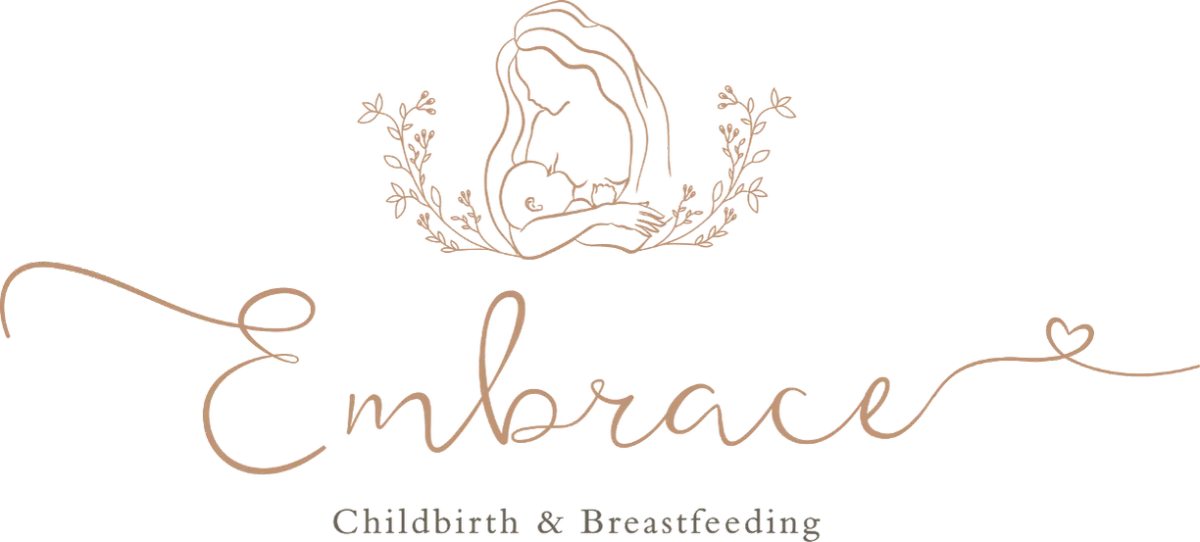
When Breastfeeding Stops: What to Expect Emotionally & Physically
Every Ending Is a New Beginning
For many parents, the end of breastfeeding is bittersweet, a mix of pride, relief, sadness, and surprise. It’s not just about milk. It’s about closing a chapter that’s been intimate, messy, and incredibly meaningful.
Maybe your little one is nursing less. Maybe your body’s saying it’s time. Or maybe your heart feels a little tug in both directions.
No matter how it happens, weaning is a transition that deserves tenderness and support.
At Embrace Childbirth and Lactation, we hold space for this shift, offering guidance that’s grounded in both science and soul.
What Happens When Breastfeeding Stops?
Physical Changes in Your Body
When you stop breastfeeding, your body starts recalibrating. Here’s what might happen:
Hormone shifts: Prolactin and oxytocin decrease while estrogen rises. This can mess with your mood, sleep, and energy.
Breast changes: You might feel engorged, leaky, or sore as your milk supply winds down.
Cycle changes: Your menstrual cycle may return, often with PMS symptoms you haven’t felt in months (or years).
It’s all normal, but that doesn’t mean it’s easy.
Emotional and Psychological Shifts
Weaning can stir up some big feelings:
Loss or grief — even if you’re ready
Guilt — especially if the end comes sooner than expected
Freedom — hello to your body, your clothes, and maybe even sleep
Your identity may shift too, especially if breastfeeding was a big part of how you saw yourself as a parent.
And let’s be real: your bond with your baby might feel different, but that doesn’t mean it’s broken. It’s just evolving.
When Is It Time to Stop Breastfeeding?
There is no one right answer for this one but when it’s time, you’ll know. Sometimes it’s mutual, sometimes it’s one sided, and sometimes it is out of necessity for health and wellness reasons.
Weaning Based on Baby’s Readiness
Some children naturally lose interest or start spacing out feeds. Signs your baby may be ready include:
Increased independence
Eating more solids
Losing interest in nursing
Shorter more distracted nursing sessions
Self Soothing without needing to nurse
Sleeping longer stretches without needing to nurse
Gradual or child-led weaning tends to be smoother, emotionally and physically.
Weaning Based on Your Needs
Sometimes the decision comes from you, and that’s just as valid.
Health concerns
Mental/emotional burnout
Returning to work
Just feeling… done
Your well-being matters too. And when you honor your own limits, you show your child what healthy boundaries look like.
How to Wean Gently and Intentionally
Tips for Gradual Weaning
Gentle weaning helps both you and your baby adjust. Here’s how:
Drop one feeding session at a time, every few days or weeks
Replace nursing with cuddles, snacks, or special one-on-one time
Use gentle redirection when needed, offer a toy, go for a walk, read a book
Don’t Offer -Don’t Refuse
Set a time limit when nursing - for example you can latch and set a timer or simply count to 10 (or whatever number works for you) and then end the nursing session.
Slower is almost always smoother.
Managing Discomfort
To ease physical symptoms:
Use cold compresses or cabbage leaves for engorgement
Avoid tight bras that can lead to clogged ducts
Stay hydrated and nourished, your body’s still doing important work
Practice emotional self-care: talk to a friend, journal, rest when you can
Express just enough to relieve pressure but do not empty the breast - the prolonged fullness actually signals your body to stop making so much milk.
Supporting Your Bond Beyond Breastfeeding
New Ways to Connect with Your Child
Breastfeeding was one way to nurture, but it’s not the only way.
Try:
Skin-to-skin snuggles
Storytime and songs
Bedtime rituals or special playtime
Your presence, attention, and love still matter most.
Reaffirming Your Role as Nurturer
Whether you weaned at six weeks or sixteen months, this truth stands:
You are still your baby’s safe space.
Partners and non-lactating parents, this is your moment, too. Connection comes in many forms.
Community Support and Lactation Services in South Lake Tahoe
Why Support Matters During Weaning
Weaning can feel lonely, especially when emotions hit hard. That’s why support matters.
Join a postpartum support group
Schedule bodywork or talk therapy
Reach out to a lactation counselor or postpartum doula
Weaning Support at Embrace Childbirth
At Embrace Childbirth and Lactation, we offer:
1:1 lactation consultations (in-home or virtual)
Guidance for physical and emotional shifts post-weaning
Holistic care from birth professionals who walk with you, without judgment
Because how you end your breastfeeding journey matters just as much as how it began.
Common Questions About When Breastfeeding Stops
How long does it take for milk to dry up?
It varies, but typically within a few days to a few weeks, depending on how gradually you wean. Though some moms will have small amounts of milk present even a year later.
Will stopping breastfeeding affect my child emotionally?
Some children may feel the change, especially if they’re older, but with love, attention, and new routines, they adjust beautifully.
Can I still bond with my baby if I’m not nursing?
Absolutely. Bonding is about presence, not just feeding.
How do I stop breastfeeding without pain?
Gradual weaning, supportive bras, cold compresses, and herbal remedies can all help ease discomfort. If pain persists, reach out to a lactation professional.
Ready to Navigate the Transition from Breastfeeding with Grace and Support?
You don’t have to do this alone.
Whether you’re weaning gently, suddenly, or somewhere in between, Embrace Childbirth and Lactation provides compassionate support for every stage.
We serve South Lake Tahoe and Carson Valley families with expert lactation care, emotional guidance, and heart-centered support.
Book your lactation support session today and discover what’s possible beyond the breastfeeding journey.
Explore Our Lactation Support Services here

